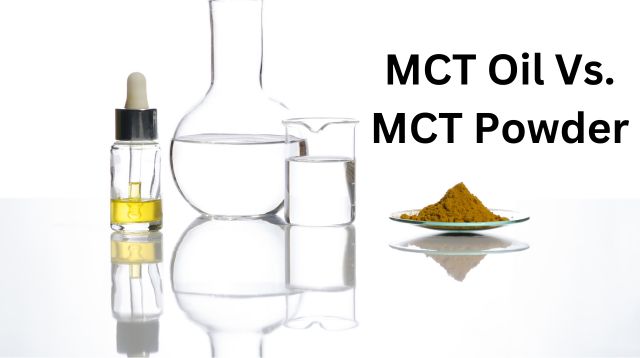Understanding the Differences: MCT Powder vs. Coconut Powder

MCT powder and coconut powder each have unique characteristics, potential benefits, and culinary and nutritional uses. Both of these items come from coconuts, but they have different nutritional profiles that offer diverse advantages.
MCT powder is focused on delivering the specific potential benefits of medium-chain triglycerides (MCTs), particularly for energy and brain function, while coconut powder serves as a versatile culinary ingredient with a broader nutrient profile. The choice between the two depends on your specific dietary and nutritional needs. Let’s compare.
Key Takeaways
- MCT powder and coconut powder originate from coconuts, but they have varying nutritional benefits.
- MCT powder provides quick energy, supports ketosis, and has increased absorption. It also helps support brain function, weight management, and energy levels.
- Coconut powder offers a balanced mix of nutrients, including fiber, protein, and fats, as well as beneficial fatty acids for weight management and overall wellness.
Understanding MCT Powder And Coconut Powder
MCT powder and coconut powder differ in their nutritional compositions and applications. MCT powder primarily contains concentrated medium-chain fatty acids, such as caprylic acid (C8) and capric acid (C10), which are swiftly metabolized into energy by the liver. It's renowned for providing a rapid and efficient energy source, making it popular among those seeking quick energy boosts. MCT powder is often associated with supporting weight management and enhanced mental clarity.
On the other hand, coconut powder is derived from dried coconut meat and contains a mix of fats, including lauric acid (C12) and other MCTs, albeit in much lower concentrations than MCT powder. Additionally, coconut powder retains the natural flavor of coconut. Coconut powder provides a balanced macronutrient profile, including fiber and protein, contributing to digestive health.
Nutritional Breakdown: MCT Powder Vs Coconut Powder
When comparing MCT powder and coconut powder, it is important to note the differences in their respective nutritional profiles.
MCT powder is derived from MCT oil, offering a concentrated source of easily digestible fats. It rapidly converts to energy, aiding in metabolism. It typically contains around 70-80% MCTs.
On the other hand, coconut powder is made from dried coconut meat, providing a mix of fats, protein, and fiber. It retains the coconut's natural flavor but contains a lower percentage of MCTs compared to MCT powder.
Choosing between MCT powder and coconut powder depends on individual preferences. MCT powder is favored for its rapid energy release, while coconut powder appeals to those seeking the distinctive taste of coconut for various culinary applications.
The Potential Health Benefits Of MCT Powder
- Rapid Energy Source
MCTs in MCT powder are quickly metabolized by the liver, converting into ketones, which serve as a rapid and efficient energy source. This may help provide a fast source of quick energy. - Mental Function
Ketones produced from MCT metabolism have been associated with enhanced brain function. Some studies suggest that MCT supplementation may help support mental clarity, focus, and overall brain health. - Weight Management
MCTs have thermogenic properties, potentially increasing calorie expenditure and promoting feelings of fullness. This can contribute to weight management efforts by supporting fat loss and reducing overall calorie intake. - Athletic Performance
MCTs may benefit athletes by providing a quick source of energy during prolonged exercise. Their rapid absorption and conversion to energy make them a favorable supplement for individuals engaged in endurance activities.
MCT Powder And Mitochondrial Uncoupling:
Unlike any other fat, MCT oil is absorbed directly through the wall of your gut into your bloodstream and goes directly into your liver. In the liver, MCT oil is converted into ketones, and ketones are what stimulate mitochondrial uncoupling.
In a landmark 2008 study, researchers at Columbia University compared two groups of overweight people eating a diet with the same number of daily calories with one critical difference: one group ate olive oil, the other group consumed MCT oil. Fascinatingly, the individuals who ate MCT oil generated more heat, burned more oxygen, and lost more weight than those who consumed olive oil.
If getting into ketosis and uncoupling your mitochondria is what you want, MCT oil is the way to go.
Culinary Uses And Versatility
MCT powder and coconut powder offer an abundance of potential health benefits, as well as a variety of uses in the kitchen. Both are easy to use in cooking. MCT powder can be blended into coffee and protein shakes, as well as added to salad dressings and even in baked goods. Coconut powder retains much of its coconut flavor, making it a unique and creamy addition to curries and other sauces, soups, and baked goods.
Both products are highly versatile and make preparing meals incredibly convenient due to their range of applications.
Potential Considerations
When adding MCT powder into your diet, it’s best to start off slowly by having a small daily dose before gradually increasing the amount over time. Also, you’ll want to seek out high-quality powder made from coconut oil (not palm seed oil) and be sure it’s free of any fillers, like maltodextrin. Stabilizers like acacia gum are natural and a much healthier option.
Can’t Decide? Choose Both
By incorporating both MCT powder and coconut powder into your daily routine, you can take advantage of their unique potential benefits. Coconut powder offers many nourishing advantages, such as skin and hair health, while MCT powder contains numerous beneficial properties that can help support your well-being.
Understanding the differences between them is crucial, so you can make informed decisions about which one best suits your needs and goals.
Frequently Asked Questions
Is MCT Powder The Same As Coconut Powder?
MCT Powder is a form of coconut powder created when fractionated coconut oil and organic acacia gum fibers are homogenized and dried using spray technology. This unique combination results in an all-natural powder that utilizes the goodness of both oils.
Can Anyone Use MCT Powder?
If you’re interested in trying MCT powder, there’s one thing you’ll want to do first. It’s always a good idea to talk with your doctor before taking any type of dietary supplement, including MCT powder.
Are There MCTs In Coconut Milk Powder?
Coconut milk powder does contain medium-chain triglycerides (MCTs). The primary MCT found in coconut is lauric acid, along with smaller amounts of caprylic acid and capric acid. While lauric acid is technically classified as a long-chain fatty acid, it exhibits metabolic properties similar to MCTs due to its shorter chain length.
While both coconut powder and MCT powder contribute MCTs to the diet, MCT powder provides a more targeted and concentrated source of these beneficial fatty acids.
Related posts


